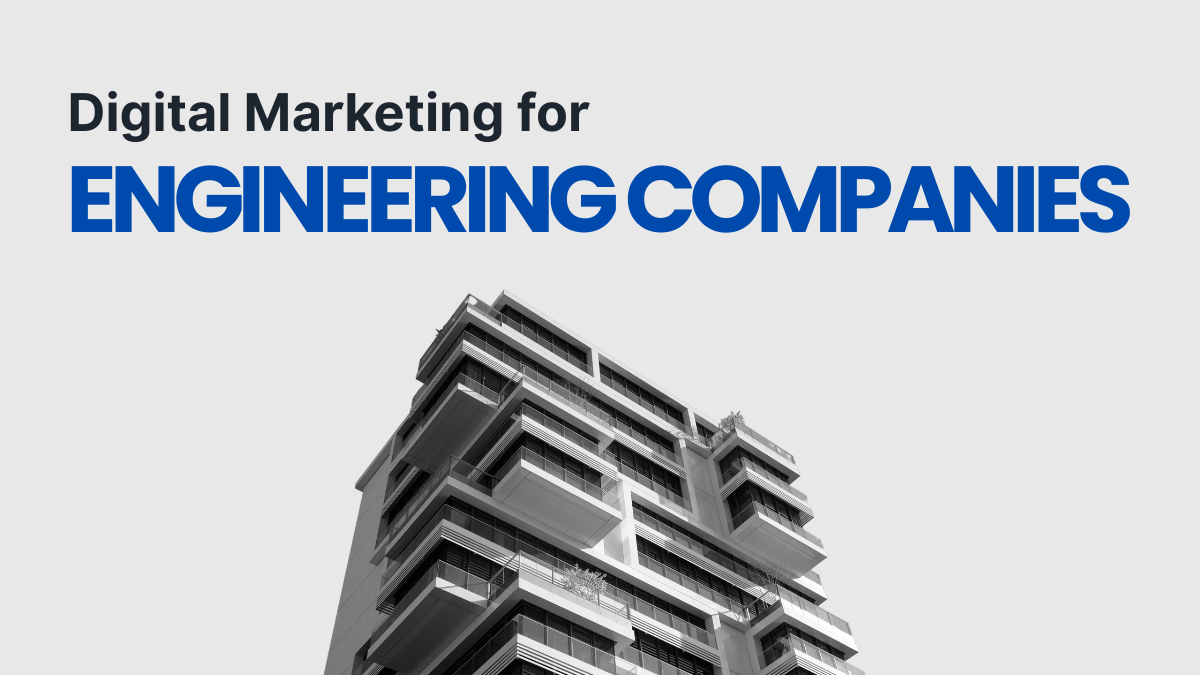
Digital Marketing for Engineering Companies
Your engineering firm does incredible work. You design, build, and innovate, solving complex problems with precision. But here's a question: do your potential clients know that? If your answer is a hesitant "maybe," it's time to talk about digital marketing. You might think marketing is just for consumer brands, but it's a powerful tool for engineering companies to attract better projects, top talent, and build a stellar reputation.
This guide will walk you through the world of digital marketing in a straightforward way. We'll skip the jargon and focus on practical steps you can take to grow your firm. You'll learn why digital marketing matters, which strategies work best for engineers, and how to tell if your efforts are paying off. Throughout the guide, you'll also find real-world examples, actionable tips, and best practices to make every tactic easy to understand—even if you're just starting out.
Let's dive in and build a marketing plan as solid as your blueprints.
Why Do Engineering Firms Need Digital Marketing?

In the past, a good reputation and word-of-mouth were enough. While those are still vital, the way clients find and vet engineering partners has changed. Project managers, procurement officers, and executives now start their search online. They look for case studies, technical expertise, and proof of past success long before they ever pick up the phone.
Digital marketing puts you right where they're looking. It’s not about flashy ads; it's about showcasing your expertise and building trust.
Here’s what a solid digital strategy can do for you:
-
Generate High-Quality Leads: Attract clients who are actively searching for the specific services you offer.
-
Build Authority and Trust: Position your firm as a leader in your niche by sharing your knowledge.
-
Showcase Your Projects: A picture is worth a thousand words, and a detailed project portfolio is priceless.
-
Attract Top Talent: Great engineers want to work for innovative, forward-thinking companies. Your online presence is often their first impression.
-
Stay Ahead of the Competition: If your competitors are online, you need to be there too. If they aren't, you have a huge opportunity to get ahead.
Industry Example:
Imagine a mid-sized civil engineering firm specializing in bridge construction. Instead of relying only on referrals, they create an online portfolio with interactive before-and-after photos of recent projects and client testimonials. Their website appears when municipalities search for “experienced bridge engineering firms”—and generates more qualified inquiries than traditional advertising ever did.
Starting with Strategy: Your Digital Blueprint

Before you create a single post or send one email, you need a plan. Just like you wouldn't start a construction project without a blueprint, you shouldn't start marketing without a strategy.
Define Your Ideal Client
Who do you want to work with? Get specific. Don't just say "property developers." Instead, think about:
-
Industry: Commercial real estate, municipal infrastructure, renewable energy?
-
Company Size: Are you targeting large corporations or smaller local businesses?
-
Project Type: What kinds of projects are most profitable and fulfilling for your team?
-
Their Challenges: What problems are they trying to solve that your firm is uniquely qualified to handle?
Actionable Tip:
Create detailed client personas. You can use a simple spreadsheet to jot down their titles, challenges, goals, and preferred communication channels. This step makes your marketing efforts much more targeted and effective.
Scenario Example:
An engineering firm focused on green building solutions realized most inquiries came from small architects looking for sustainable partners rather than the big developers they previously targeted. By refining their persona and messaging, their website conversions increased by 25%.
Set Clear Goals
What do you want to achieve with your marketing? Your goals should be specific and measurable.
-
Bad Goal: "We want more leads."
-
Good Goal: "We want to generate 10 qualified leads per month for our structural engineering services through our website."
-
Good Goal: "We want to increase traffic to our website's case studies page by 20% in the next six months."
Pro Tip:
Break down bigger goals into quarterly or even monthly targets, so you can monitor progress and adjust tactics quickly. Use free project management tools like Trello or Asana to keep your marketing plan organized.
Core Digital Marketing Strategies for Engineers

Now for the fun part. Let's look at the most effective digital marketing channels for engineering firms. You don't need to do everything at once. Start with one or two and build from there. Mix and match these strategies based on your priorities and available resources.
1. Your Website: The Digital Home Base
Your website is the most important part of your digital marketing. It's your 24/7 salesperson and portfolio. It needs to be professional, easy to navigate, and designed to turn visitors into leads.
-
Modern and Professional Design: Your website's look should reflect the quality of your engineering work.
-
Mobile-Friendly: More than half of all web traffic comes from mobile devices. Your site must look and work great on a smartphone.
-
Clear Services Pages: Clearly explain what you do. Use simple language to describe your services and the value you provide.
-
Project Portfolio/Case Studies: This is crucial. Showcase your best work with high-quality photos, project details, challenges you overcame, and the final results. This is your proof of expertise.
-
Clear Calls-to-Action (CTAs): Tell visitors what you want them to do next. Use buttons like "Request a Consultation," "View Our Projects," or "Contact Us."
Best Practice:
Include a dedicated “Awards & Certifications” page—engineering clients and partners love working with reputable firms that stand out. Feature your team’s credentials and any company accreditations for credibility.
Real-World Example:
A structural engineering firm improved their home page by adding a free downloadable checklist—“10 Questions to Ask Before Hiring a Structural Engineer.” This single addition doubled their weekly consultation requests.
Additional Tip:
Use customer testimonials and brief video walkthroughs of completed projects for extra engagement.
2. Search Engine Optimization (SEO): Get Found on Google
SEO is the process of optimizing your website so it shows up when potential clients search for terms related to your services. When a project manager searches for "civil engineering firm in Houston," you want your company to appear on the first page.
How to Approach SEO:
-
Keyword Research: Identify the terms your ideal clients are searching for. Think like them. They might search for "geotechnical analysis for commercial buildings" or "sustainable MEP design."
-
On-Page SEO: Place these keywords in logical places on your website, such as your page titles, headings, and service descriptions. This helps Google understand what your pages are about.
-
Local SEO: For firms serving a specific geographic area, setting up a Google Business Profile is a must. It helps you appear in local search results and on Google Maps.
Bonus Strategies:
-
Schema Markup: This is special code that helps Google understand your company’s key information, such as services, reviews, and office locations.
-
Blogging for SEO: Choose blog topics that answer your clients’ most common technical questions or concerns. Write posts like "What Is Value Engineering in Construction?" or "Regulatory Compliance Checklist for Civil Engineers."
Case Study:
A geotechnical engineering company started publishing monthly blog posts targeting local construction trends and regulations. Within one year, their organic search inquiries grew by over 60%.
3. Content Marketing: Share Your Expertise
Content marketing is about creating and sharing valuable information to attract and engage your audience. For engineering firms, this is your chance to prove you're the experts. Instead of "selling," you are "educating."
Content Ideas for Engineering Firms:
-
Write articles that answer common client questions. For example, "5 Things to Consider When Choosing a Structural Engineer" or "The Rise of Sustainable Building Materials."
-
Go beyond your portfolio. Write a detailed story about a challenging project. Explain the problem, your process, and the successful outcome. These are incredibly powerful for building trust.
-
For complex topics, a detailed white paper can position you as a thought leader. You can offer it as a download in exchange for a visitor's email address, which helps you build your lead list.
-
Create a short video tour of a completed project, interview your lead engineers, or use drone footage to show off the scale of your work.
Industry-Specific Scenario:
If you worked on a hospital expansion, write a piece called “Lessons Learned from Healthcare Facility Upgrades.” Discuss project constraints, building codes, or energy efficiency solutions. These educational pieces help position you as a reliable partner to similar institutions.
Actionable Content Tips:
-
Repurpose lengthy white papers into bite-sized LinkedIn posts.
-
Record webinars on trending topics—like “Resilient Bridge Design After Extreme Weather Events”—and upload the recordings to your site.
-
Share behind-the-scenes photos or employee spotlights to humanize your team.
4. LinkedIn: The Professional's Social Network
If you're going to pick just one social media platform, make it LinkedIn. It’s where business professionals connect, share industry news, and vet potential partners.
How to Use LinkedIn:
-
Make sure your company page is complete with a compelling description, your logo, and a link to your website.
-
Post your blog articles, case studies, and company news on your LinkedIn page.
-
Your engineers are your greatest asset. Encourage them to share company content and engage with industry discussions from their personal profiles.
-
Don't just post and leave. Follow relevant industry publications, join groups, and comment on other people's posts. It’s about building relationships.
Industry Example:
A mechanical engineering consulting firm noticed that their engineers’ posts about daily problem-solving on job sites generated more engagement than official press releases.
Extra Strategies:
-
Use LinkedIn Polls to ask your network about industry trends, then share results in a follow-up post.
-
Connect privately with decision-makers at target firms and introduce your expertise.
-
Post short slideshows about “The Top 3 Mistakes in HVAC Retrofitting and How to Prevent Them.”
5. Email Marketing: Nurture Your Leads
Email marketing is a direct and effective way to stay in touch with potential clients and past customers. It’s not about spamming inboxes. It's about nurturing relationships over time by providing value.
-
Add a sign-up form to your website, offering something of value like a newsletter or a downloadable guide.
-
Create a simple monthly or quarterly newsletter. Share your latest blog post, a featured project, and some company news.
-
When someone downloads a white paper, you can send them a series of automated follow-up emails that provide more information and gently guide them toward a consultation.
Real-World Example:
A water resources engineering firm started a monthly email “Insider Briefing” with project updates and regulatory insights. Within six months, their open rates were above 40%, and they booked meetings with two new municipal clients.
Additional Tips:
-
Keep your emails short and visual—photos, infographics, and GIFs keep readers engaged.
-
Segment your list so clients only get content that’s relevant to their industry or interests. For example, architects get different updates than local council officials.
6. Paid Advertising: Amplify Your Reach
While organic tactics are critical, targeted ads can boost your digital marketing—especially when you want quick results.
Recommended Channels:
-
Google Ads: Bid on keywords like “structural engineering firm near me.” Appear at the top of search results to attract urgent project inquiries.
-
LinkedIn Ads: Highly targeted for B2B. Promote white papers, industry reports, or webinar invites to executives and engineers in specific companies or sectors.
Scenario Example:
An environmental engineering company ran LinkedIn ads targeting renewable energy developers. By offering a free “Site Readiness Checklist,” they attracted 50+ qualified leads with a modest ad budget.
Actionable Paid Media Tips:
-
Always set a budget and track return on investment. Start small, test your messaging, and scale up when you find what works.
-
Use retargeting ads to reach people who visited your website but didn’t get in touch—they’re already interested!
7. Online Reviews and Testimonials: Build Social Proof
Engineering projects are high stakes—clients want reassurance that you can deliver. Social proof is key.
-
After a successful project, ask satisfied clients to review your firm on Google or LinkedIn.
-
Place testimonials prominently on your site’s home and project pages, with permission.
-
Thank clients for positive reviews and respond professionally to criticism. It shows you care about quality and continuous improvement.
Tip:
Include client logos (with approval) on your homepage to build instant credibility.
Measuring Your Success: How to Know It's Working

How do you know if your digital marketing is actually making a difference? You need to track your results. Tools like Google Analytics can help you measure key metrics.
Here are a few important things to watch:
-
Website Traffic: How many people are visiting your website? Is the number growing over time?
-
Traffic Sources: Where are your visitors coming from? (e.g., Google searches, LinkedIn, direct visits). This tells you which channels are working best.
-
Leads Generated: How many people filled out your contact form or called you? This is the most important metric.
-
Keyword Rankings: Where do you rank on Google for your most important keywords? Are you moving up?
Industry Case Study:
A small bridge design firm invested in regular SEO and LinkedIn updates. After six months, their organic web traffic tripled, and they started receiving project inquiries from out-of-state clients for the first time. Tracking their numbers allowed them to see exactly which efforts drove results.
Deeper Insights:
-
Use “session recordings” (with privacy compliance) to watch how visitors use your site—are they finding information easily?
-
Calculate your cost per lead (total spend divided by the number of qualified leads) to ensure you’re marketing efficiently.
Final Thoughts
Digital marketing for engineering companies doesn't have to be complicated. It's about consistently showing up online, sharing your expertise, and making it easy for the right clients to find you.
Here’s a simple way to get started:
-
Review Your Website: Is it modern, professional, and mobile-friendly? If not, start there.
-
Write One Case Study: Pick a successful project and write a detailed post about it. Share it on your website and on LinkedIn.
-
Set Up Your Google Business Profile: This is a quick win for local search and costs nothing.
-
Ask for Testimonials: After every contract wraps up, request a Google review or client statement. Add them to your site right away.
-
Set a Monthly Marketing Meeting: Schedule a recurring meeting—even if it’s just with yourself—to review your progress and decide on next steps. Consistency is key.
Long-Term Growth Tip:
As you gain confidence, consider hiring a freelance content writer or a digital marketing agency with experience in the engineering sector to scale your content and amplify results.
Final Inspiration:
Digital marketing lets you shape your company’s future. Every post, case study, or project photo shared online strengthens your brand and brings you closer to your ideal clients and projects.
30 minutes
Expert Consultation
Terms & Agreements
By booking a free 30-minute consultation, you agree to our terms, including scheduling, cancellation policies, and confidentiality. The session provides expert advice without guarantees of specific outcomes or results.






Leave a Reply
Your email address will not be published. Required fields are marked *